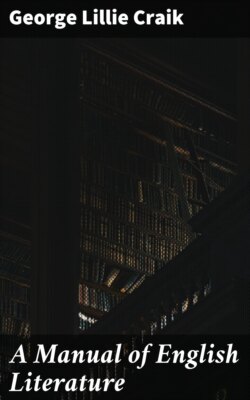Читать книгу A Manual of English Literature - George Lillie Craik - Страница 18
На сайте Литреса книга снята с продажи.
The Latin Language.
ОглавлениеDuring the whole of the Anglo-Norman period, and down to a much later date, in England as in the other countries of Christendom, the common language of literary composition, in all works intended for the perusal of the educated classes, was still the Latin, the language of religion throughout the western world, as it had been from the first ages of the Church. Christianity had not only, through its monastic institutions, saved from destruction, in the breaking up of the Roman empire, whatever we still possess of ancient literature, but had also, by its priesthood and its ritual, preserved the language of Rome in some sort still a living and spoken tongue—corrupted indeed by the introduction of many new and barbarous terms, and illegitimate acceptations, and by much bad taste in style and phraseology, but still wholly unchanged in its grammatical forms, and even in its vocabulary much less altered than it probably would have been if it had continued all the while to be spoken and written by an unmixed Roman population. It would almost seem as if, even in the Teutonic countries, such as England, the services of the church, uninterruptedly repeated in the same words since the first ages, had kept up in the general mind something of a dim traditionary understanding of the old imperial tongue. We read of some foreign ecclesiastics, who could not speak English, being accustomed to preach to the people in Latin. A passage quoted above from the Croyland History seems to imply that Gislebert, or Gilbert, one of the founders of the University of Cambridge, used to employ Latin as well as French on such occasions. So, Giraldus Cambrensis tells us that, in a progress which he made through Wales in 1186, to assist Archbishop Baldwin in preaching a new crusade for the delivery of the Holy Land, he was always most successful when he appealed to the people in a Latin sermon; he asserts, indeed, that they did not understand a word of it, although it never failed to melt them into tears, and to make them come in crowds to take the cross. No doubt they were acted upon chiefly through their ears and their imaginations, and for the most part only supposed that they comprehended what they were listening to; but it is probable that their self-deception was assisted by their catching a word or phrase here and there the meaning of which they really understood. The Latin tongue must in those days have been heard in common life on a thousand occasions from which it has now passed away. It was the language of all the learned professions, of law and physic as well as of divinity, in all their grades. It was in Latin that the teachers at the Universities (many of whom, as well as of the ecclesiastics, were foreigners) delivered their prelections in all the sciences, and that all the disputations and other exercises among the students were carried on. It was the same at all the monastic schools and other seminaries of learning. The number of persons by whom these various institutions were attended was very great: they were of all ages from boyhood to advanced manhood; and poor scholars must have been found in every village, mingling with every class of the people, in some one or other of the avocations which they followed in the intervals of their attendance at the Universities, or after they had finished their education, from parish priests down to wandering beggars.
